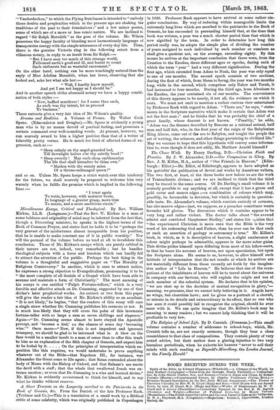A Short Tractate on the Longevity ascribed to the Patriarchs
in the Book of Genesis, &c. From the Danish of the late Professor Rask. (Tritliner and Co.)—This is a translation of a small work by a Biblical critic of some celebrity, which was originally published in Copenhagen
in 1828. Professor Rask appears to have arrived at some rather sin- gular conclusions. By way of reducing within manageable limits the extremely long lives which are ascribed to the patriarchs in the Book of Genesis, he has succeeded in persuading himself that, at the time that book was written, a year was a much shorter period than that which is now signified by the term. In order to determine how long this period really was, he adopts the simple plan of dividing the number of years assigned to each individual by such number or numbers as shell give a quotient not, on the average, exceeding eighty. By this means he arrives at the important conclusion that there were, from the Creation to the Exodus, three different ages or epochs, during each cd which the term " year " had a very different signification. During the first age, which extended from Adam to Noah, the year was only equal to one of our months. The second epoch consists of two sections, during the first of which, from Shona to Scrag, the year was two months long, while in the second, which comprises only Nahor and Terah, it had increased to four months. During the third age, from Abraham to the Exodus, the year contained six of our months. The convenience of this theory appears to be nearly, if not all, the evidence on which it rests. We must not omit to mention a rather curious view entertained by Professor Rask with regard to Adam. "There are," he says, "state- ments in the Scripture narrative which make it certain that Adam was not the first man ;" and he thinks that he was probably the chief of a great family, whose descent is not known. "Possibly," he adds, "Adam was the Oannes described by Berosus as a rational animal, half man and half fish, who, in the first year of the reign of the Babylonian King Aloros, came out of the sea to Babylon, and taught the people the art of writing, the sciences, and other things pertaining to civilized life." May we venture to hope that this hypothesis will convey some informa- tion to, even though it does not edify, Mr. Matthew Arnold himself?






























 Previous page
Previous page